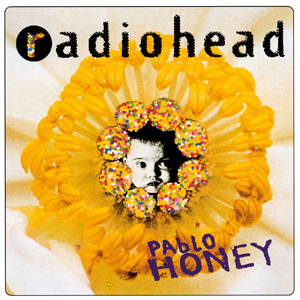
Pablo Honey is the debut studio album by the English rock band Radiohead, released on 22 February 1993 in the UK by Parlophone and on 20 April in the US by Capitol Records. It was produced by Sean Slade, Paul Q. Kolderie and Radiohead's co-manager Chris Hufford.

"Paranoid Android" is a song by English alternative rock band Radiohead, released as the lead single from their third studio album OK Computer (1997) on 26 May 1997. The lyrics were written by singer Thom Yorke following an unpleasant experience in a Los Angeles bar. The song is over six minutes long and contains four sections. The name is taken from Marvin the Paranoid Android from the science fiction series The Hitchhiker's Guide to the Galaxy.

Belly is an alternative rock band formed in Rhode Island in 1991 by former Throwing Muses and Breeders member Tanya Donelly. The original lineup consisted of Donelly on vocals and guitar, Fred Abong on bass, and brothers Tom and Chris Gorman on guitar and drums respectively. The band released two albums during the early 1990s alternative rock boom before breaking up in 1995. They reunited in 2016 and mounted limited tours in the United States and United Kingdom that year.
The Gants was an American garage rock band that formed in 1964 in Greenwood, Mississippi, in the cultural and geographic Deep South.
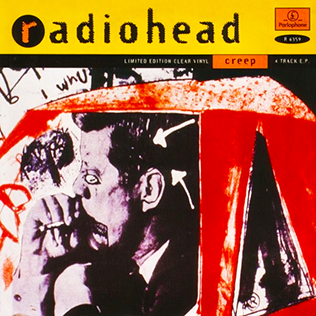
"Creep" is the debut single by the English rock band Radiohead, released on 21 September 1992. It appeared on their debut studio album, Pablo Honey (1993). Radiohead took elements from the 1972 song "The Air That I Breathe"; following legal action, Albert Hammond and Mike Hazlewood are credited as cowriters.

"Fake Plastic Trees" is a song by the English rock band Radiohead, released on their second album, The Bends (1995). It was the third single from The Bends in the UK, and the first in the US. It reached the top 50 on the UK Singles Chart, the New Zealand Singles Chart, the US Modern Rock Tracks chart and the Canadian Rock/Alternative chart.

"Karma Police" is a song by the English alternative rock band Radiohead, released on 25 August 1997, as the second single from their third studio album, OK Computer (1997). It reached number one in Iceland and number eight on the UK Singles Chart. In the US, it peaked at number 14 on the US Alternative Songs chart. It was included on Radiohead: The Best Of (2008). The music video, directed by Jonathan Glazer, sees singer Thom Yorke in the back of a car pursuing a man. In 2021, Rolling Stone placed "Karma Police" at position 279 on its ranking of the 500 greatest songs of all time.
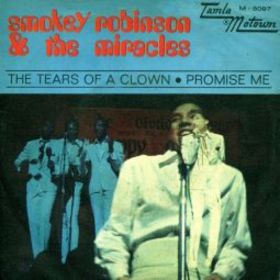
"The Tears of a Clown" is a song written by Hank Cosby, Smokey Robinson, and Stevie Wonder and originally recorded by Smokey Robinson & the Miracles for the Tamla Records label subsidiary of Motown, first appearing on the 1967 album Make It Happen. It was re-released in the United Kingdom as a single in July 1970, and it became a #1 hit on the UK Singles Chart for the week ending 12 September 1970. Subsequently, Motown released "The Tears of a Clown" as a single in the United States as well, where it quickly became a #1 hit on both the Billboard Hot 100 and R&B Singles charts.

"No Surprises" is a song by the English alternative rock band Radiohead, released as the fourth and final single from their third studio album, OK Computer (1997), on 12 January 1998. It reached number four on the UK Singles Chart. It features glockenspiel and a "childlike" sound inspired by the 1966 Beach Boys album Pet Sounds.
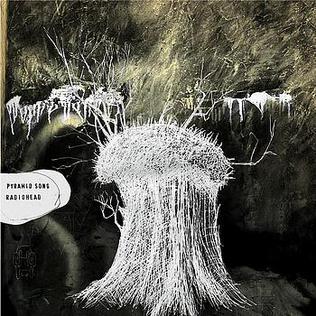
"Pyramid Song" is a song by the English rock band Radiohead, released as the lead single from their fifth studio album, Amnesiac (2001). It features piano, strings, an unusual "shuffling" rhythm and lyrics inspired by the Egyptian underworld.

"Pop Is Dead" is a song by the English rock band Radiohead. It was released as a non-album single on 10 May 1993, several months after their debut album, Pablo Honey. It reached number 42 on the UK Singles Chart, below expectations. Members of the band later said they regretted releasing it.

Beyond Salvation is the ninth studio album by the Australian hard rock band The Angels, produced and recorded in Memphis by Terry Manning. It was released in the US in November 1989 and in Australia in June 1990. The album peaked at No. 1 on the ARIA Albums Chart and it also peaked at number 3 on the Recorded Music NZ.
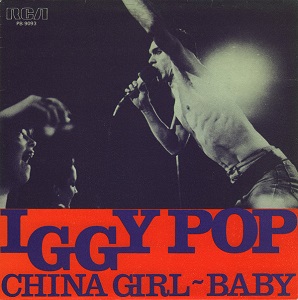
"China Girl" is a song written by Iggy Pop and David Bowie during their years in Berlin, first appearing on Pop's debut solo album, The Idiot (1977). The song became more widely known when it was re-recorded by Bowie, who released it as the second single from his most commercially successful album, Let's Dance (1983). The UK single release of Bowie's version reached No. 2 for one week on 14 June 1983, while the US release reached No. 10.

"Just" is a song by the English rock band Radiohead, included on their second album, The Bends (1995). It was released as a single on 7 August 1995.

"Little Wonder" is a song by English musician David Bowie, released as the second single from his 21st album, Earthling (1997). It was the album's biggest hit, reaching number 14 in the UK. At the 1998 Brit Awards, the song was nominated for Best British Video.
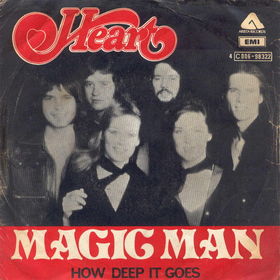
"Magic Man" is a song by the American rock band Heart released as a single off their debut album, Dreamboat Annie. Written and composed by Ann and Nancy Wilson, the song is sung from the viewpoint of a young girl who is being seduced by an older man, much to the chagrin of her mother, who calls and begs the girl to come home. In an interview, Ann Wilson revealed that the "Magic Man" was her then boyfriend, band manager Michael Fisher, and that part of the song was an autobiographical tale of the beginnings of their relationship. The album version of "Magic Man" features an over-two-minute instrumental break which consists a guitar solo and the usage of a Minimoog synthesizer, while the single version of the song edits out most of this break, cutting it down from 5:28 to 3:29.

"Stop Whispering" is a song by the English alternative rock band Radiohead, included on their debut album, Pablo Honey (1993). It was released as a single in the US in October 1993. Radiohead rerecorded it for the single release, as they were unsatisfied with the album version.
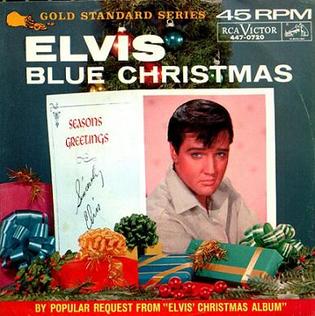
"Blue Christmas" is a Christmas song written by Billy Hayes and Jay W. Johnson and most famously performed by Elvis Presley; it was first recorded by Doye O'Dell in 1948. It is a tale of unrequited love during the holidays and is a longstanding staple of Christmas music, especially in the country genre.
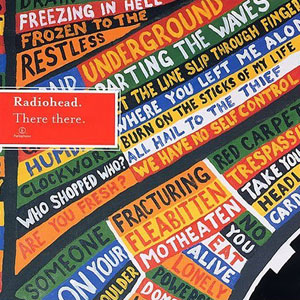
"There There" is a song by the English rock band Radiohead. It was released as the lead single from their sixth album, Hail to the Thief (2003), on 26 May 2003. It reached number four on the UK Singles Chart, number one in Canada and Portugal, and number 14 on the US Billboard Modern Rock Tracks chart. The song appears on Radiohead: The Best Of (2008).

"The Boy in the Bubble" is a song by the American singer-songwriter Paul Simon. It was the third single from his seventh studio album, Graceland (1986), released on Warner Bros. Records. Written by Simon and Forere Motloheloa, its lyrics explore starvation and terrorism, juxtaposed with wit and optimism.


















